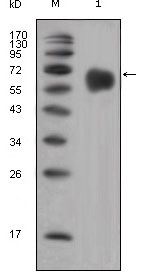FGFR4 Mouse Monoclonal Antibody [Clone ID: 7H1]
Frequently bought together (1)
Other products for "FGFR4"
Specifications
| Product Data | |
| Clone Name | 7H1 |
| Applications | IF |
| Recommended Dilution | ICC: 1/200-1/1000 |
| Reactivities | Human |
| Host | Mouse |
| Isotype | IgG1 |
| Clonality | Monoclonal |
| Immunogen | Purified recombinant extracellular fragment of human FGFR4 fused with hIgGFc tag expressed in HEK293 cell line. |
| Formulation | Liquid in PBS containing 50% glycerol, 0.5% BSA and 0.03% Proclin 300, pH 7.3. |
| Concentration | lot specific |
| Purification | Ascitic Fluid |
| Conjugation | Unconjugated |
| Storage | Store at 4°C short term. Aliquot and store at -20°C long term. Avoid freeze/thaw cycles. |
| Stability | 1 year |
| Predicted Protein Size | 87.9kDa |
| Gene Name | fibroblast growth factor receptor 4 |
| Database Link | |
| Background | Swiss-Prot Acc.P22455.FGFR4: fibroblast growth factor receptor 4. Entrez Protein NP_002002. It is a member of the fibroblast growth factor receptor family, where amino acid sequence is highly conserved between members and throughout evolution. FGFR family members differ from one another in their ligand affinities and tissue distribution. A full-length representative protein would consist of an extracellular region, composed of three immunoglobulin-like domains, a single hydrophobic membrane-spanning segment and a cytoplasmic tyrosine kinase domain. The extracellular portion of the protein interacts with fibroblast growth factors, setting in motion a cascade of downstream signals, ultimately influencing mitogenesis and differentiation. The genomic organization of this gene, compared to members 1-3, encompasses 18 exons rather than 19 or 20. Although alternative splicing has been observed, there is no evidence that the C-terminal half of the IgIII domain of this protein varies between three alternate forms,as indicated for members 1-3. This particular family member preferentially binds acidic fibroblastgrowth factor and, although its specific function is unknown, it is overexpressed in gynecologicaltumor samples, suggesting a role in breast and ovarian tumorigenesis. |
| Synonyms | CD334; FGFR-4; JTK2; MGC20292; OTTHUMP00000161430; TKF |
| Reference Data | |
Documents
| Product Manuals |
| FAQs |
| SDS |
{0} Product Review(s)
0 Product Review(s)
Submit review
Be the first one to submit a review
Product Citations
*Delivery time may vary from web posted schedule. Occasional delays may occur due to unforeseen
complexities in the preparation of your product. International customers may expect an additional 1-2 weeks
in shipping.






























































































































































































































































 Germany
Germany
 Japan
Japan
 United Kingdom
United Kingdom
 China
China




